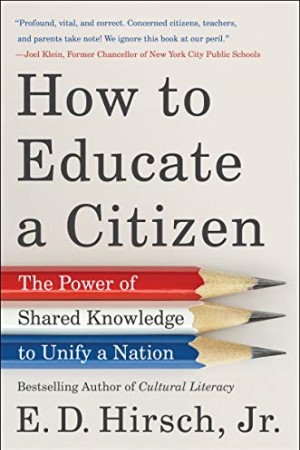How to Educate a Citizen
The Power of Shared Knowledge to Unify a Nation
Publisher Harper Collins – September 8, 2020
The bestselling author of Cultural Literacy addresses the failures of America’s early education system and its impact on our current national malaise
In this powerful manifesto, E.D. Hirsch, Jr., urges America’s schools, particularly at the elementary level, to educate our children more effectively to help heal and preserve the nation. Since the 1960s, our schools have been relying on “child-centered learning.” History, geography, science, civics, and other essential knowledge have been dumbed down by vacuous learning “techniques” and “values-based” curricula. Indoctrinated by graduate schools of education, administrators and educators have come to believe they are teaching reading and critical thinking skills. Yet these cannot be taught in the absence of strong content and a common to all educational foundation.
The consequence is a loss of shared knowledge that would enable us to work together, understand one another, and make coherent, informed decisions. A broken approach to school not only leaves our children under-prepared and erodes the American dream but also loosens the spiritual bonds and unity that hold the nation together. Drawing on early schoolmasters and educational reformers such as Noah Webster and Horace Mann, Hirsch charts the rise and fall of the American early education system and provides a blueprint for closing the national gap in knowledge, communications, and allegiance. Critical and compelling, How to Educate a Citizen galvanizes our schools to equip children with the power of shared knowledge.
“No one who has thought and written about American education in the last half century casts a longer shadow than E.D. Hirsch, Jr. He is the one person whose work illuminates—and offers a potential remedy—for the inequities that have plagued our classrooms and our society for generations. If you care about our country and our democracy, don’t just read How to Educate a Citizen, study it.”
— Robert Pondiscio, Author, How the Other Half Learns.
“Profound, vital and correct. Hirsch highlights the essence of our American being and the radical changes in education necessary to sustain that essence. Concerned citizens, teachers, and parents take note! We ignore this book at our peril.”
— Joel Klein, former Chancellor of New York City Public Schools
“Anyone [who’s] struggled to read an article stuffed with technical or legal jargon, or with arcane references to obscure places and events, has had a taste of what it’s like to be a child who has been deprived of the cultural touchstones that literate adults take for granted. Hirsch is performing a brave and invaluable service by reminding us that proficient reading depends not just on skilled eyes and ears but on an educated mind.”
— Steven Pinker, Johnstone Professor of Psychology, Harvard University, author of The Language Instinct and The Sense of Style on Why Knowledge Matters
“Hirsch has done it again. He has produced the most clear and well-grounded argument for why a knowledge-centric education is critical for enhancing educational equity. He pulls no punches. Why Knowledge Matters provides thoughtful solutions to important education issues.”
— Susan B. Neuman, professor and chair, Teaching and Learning Department, Steinhardt School, New York University on Why Knowledge Matters
“If you are frustrated and angry about the over-testing of students, the narrowing of the curriculum, the scapegoating of teachers, and the persistence of the achievement gap, you must read this brilliant book. Hirsch persuasively explains how all these phenomena are related, and points the way forward to a better education for all.”
— Daniel T. Willingham, professor, University of Virginia on Why Knowledge Matters

